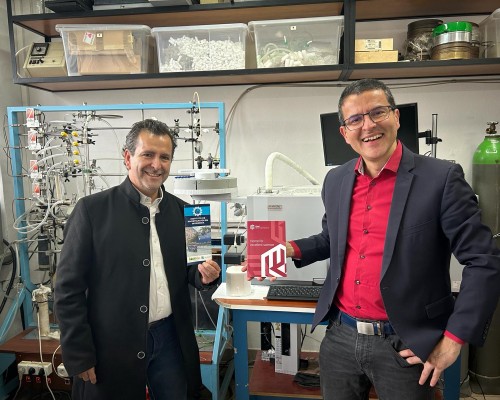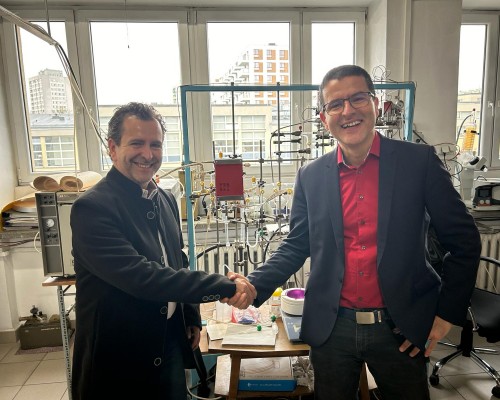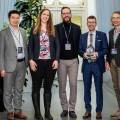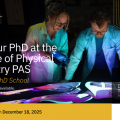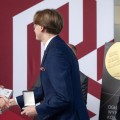“From science to business, from science to justice” – interview with Prof. Fernando Colmenares and Prof. Juan Carlos Colmenares about RDI opportunities, collaboration potential, PhD studies at IChF and the double BERSTIC summit in Colombia and Poland
Reading time: about 21 minuts
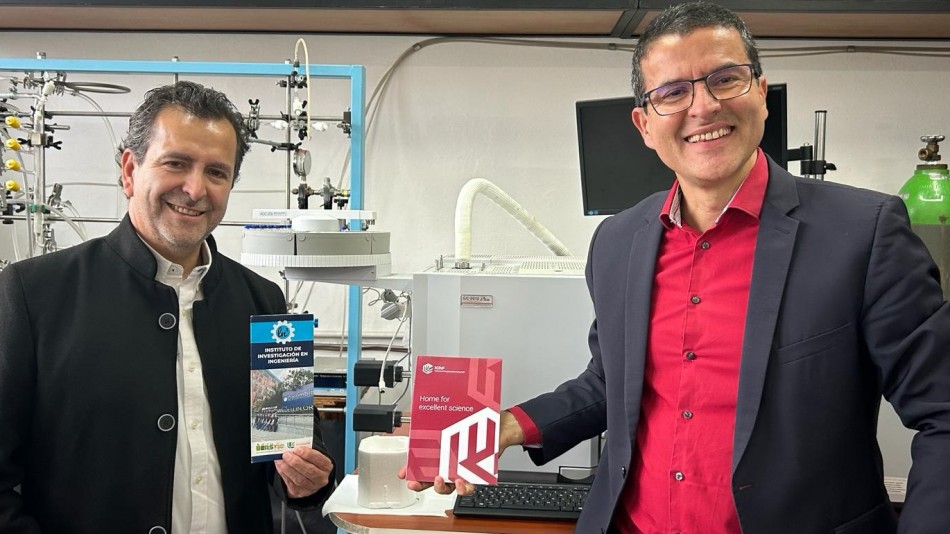
We are pleased to present an exclusive interview with Colombian Professors Fernando Colmenares and Juan Carlos Colmenares, offering insights into their long-time connections with Poland, ongoing scientific endeavors and identified potential for collaboration, the attractiveness of pursuing a PhD at the Institute of Physical Chemistry of the Polish Academy of Sciences (IChF) in Poland for Colombian and Latin American students, as well as the joint September summit that the IChF is co-organizing with the Engineering Research Institute (In3) / Universidad Cooperativa de Colombia (UCC) of the Science, Technology, Innovation, and Culture Network – BERSTIC in 2024.
Both professors play pivotal roles within the BERSTIC network. Prof. Fernando Colmenares holds the esteemed position of Science Diplomacy promotor via BERSTIC network for the In3/UCC sponsored by the Colombian Ministry of Science, Technology and Innovation (MinCiencias) to Belgium, Spain, and Poland. Additionally, he serves as the director of In3 of the UCC, a strategic partner of the IChF within BERSTIC. On the other hand, Prof. Juan Carlos Colmenares, based in Warsaw, coordinating the Catalysis and materials for sustainable transformations Excellence Cluster and leading a research group at IChF, plays a crucial role as a distinguished liaison between BERSTIC and the IChF, ensuring effective collaboration and driving scientific exchange.
Notably, the interview sheds light on the upcoming BERSTIC multistage conference. The conference commences in May 2024 in the Wayuu indigenous Colombian region of La Guajira, followed by a series of virtual scientific panels. The culmination of the event will take place on 19 and 20 of September at IChF, where over 70 prominent guests from Latin America, and various European countries will convene for a summit.
This interview, conducted by Dr. Anna Przybyło-Józefowicz at the end of March 2024, showcases a dynamic landscape of scientific, academic and entrepreneur cooperation between Poland and Colombia, as well as Latin America and Europe. We kindly invite you to read it.
Introduction of the interviewees
During his recent visit to Poland in March and April 2024, Prof. Fernando Colmenares pursued several objectives. Firstly, he conducted a seminar aimed at PhD and postdoctoral students as well as researchers, focusing on socializing the methodology and approaches of the BERSTIC Network for international cooperation in science, technology, innovation, and culture. Additionally, Prof. Colmenares visited laboratories at IChF and its partner institutions in Poland to collaborate on data processing for the creation of digital twins and the utilization of optimization techniques. Moreover, he held working sessions with research groups within IChF, particularly the Catalysis for sustainable energy production and environmental protection (CatSEE) group led by Professor Juan Carlos Colmenares, focusing on catalysis for sustainable energy production and environmental protection. Finally, Prof. Colmenares provided his support at the PhD thesis defense of Abdul Qayyum at IChF, where he serves as an external advisor.
Prof. Fernando Colmenares is a Mechanical and Aeronautical Engineer with a Master's degree specializing in Turbine and Internal Combustion Engines at Warsaw University of Technology (Poland). He has a PhD in Engineering focusing on energy, hydrogen, biomass, power systems, optimization, and artificial intelligence, and postdoc in Aerospace Engineering at Cranfield University (UK). Currently, he is involved in a postdoc in science diplomacy at Antwerp University and KU Leuven in Belgium – an initiative sponsored by MinCiencias in Colombia. He serves as CEO of the Engineering Research Institute (its founder), and as a Full Professor. Prof. F. Colmenares founded and lead the Network in Science, Technology, Innovation, and Culture for LATAM & Europe. He is a member of various organizations, providing advisory and mentoring services. His background reflects his dedication to engineering, research, and education, engaging with academia, industry, communities, government, and international cooperation.
Prof. Juan Carlos Colmenares is a full professor at the Institute of Physical Chemistry of the Polish Academy of Sciences (IChF). He is a Marie Skłodowska-Curie fellow. He graduated from the Warsaw University of Technology (1995) and obtained his MSc (1997) in catalysis. He got his PhD (2004) in chemistry from the same university. He then worked as a postdoctoral fellow at the University of Córdoba (2005–2006) in Prof. Marinas' group and later at the University of Southern California (2006–2009) in Prof. George Olah's (Nobel Prize in Chemistry) group. He received his habilitation (DSc) in 2015 from IChF. Prof. Juan Carlos Colmenares leads the Catalysis for sustainable energy production and environmental protection Research Group and coordinates the Excellence Cluster nr. 3 at IChF. His interests range from materials science to biomass valorization, photocatalysis, and sonocatalysis.
What ties do you have to Poland and how far does your history go with our country?
Prof. Fernando Colmenares:
Since 1989 I received a scholarship in Poland from a Colombian institution that still exists, ICETEX, which promotes studies abroad. I'm still working with them. I wanted to study in a country of the socialist bloc, I had the option of the USSR or Poland, but your country attracted me, especially due to a contact with the Polish Embassy, which was the most receptive when I was inquiring into the embassies of several countries. There was a portfolio of careers from which you could choose, I initially chose naval engineering, but being here in Łódź where I studied Polish and science to level up the academic position of Poland, I was able to change for a dream which was to study aeronautical engineering. I first studied at the Rzeszów University of Technology for a year and a half, and then I was able to transfer to the Warsaw University of Technology, where I did my master's degree in propulsion and power systems connected to both aeronautical and energy sector, at the Faculty of Power and Aeronautical Engineering.
This is my connection with Poland, and I have family here too, I have a half-Polish, half-Colombian daughter, who still lives here in Warsaw, and we have a fluid relationship. For me, Poland has always been my second country, I have had the interest of facilitating collaboration with Poland in Science, Technology, and Innovation.
Things have become easier; thanks to the connection my brother Prof. Juan Carlos Colmenares has with Poland. I returned to Colombia after eight and a half years of being here. There I worked in the industry for 8 years and then decided to do my doctorate and postdoctorate in England, on topics related to aerospace and artificial intelligence and connected to fuel systems, including biofuels and hydrogen (sustainable aviation fuels – SAF).
I would like to continue connecting with Poland as a Colombian researcher, since the level of education in Poland is very high and, knowing it from my own experience, I am an ambassador of education in Poland, Colombia, and Latin America. With the students that I work there, I am encouraging them to come here.
Prof. Juan Carlos Colmenares:
I arrived in Poland two years after my brother Prof. Fernando Colmenares, in 1991 for an ICETEX scholarship that I won. They also offered me a portfolio of careers to choose from and the one that was closest to my profile was oil exploitation, which was offered in Kraków and was the one I chose. But once I was here, I had the opportunity to switch to chemistry, which has always been my favorite discipline. I chose a career in the Department of Chemistry of the Warsaw University of Technology. I did my master's degree there, my brother at this time also went to the same academic institution in Warsaw. I then applied for a PhD scholarship in the same department at Warsaw University of Technology and was accepted. After finishing the doctorate, I returned to Colombia, worked for a year there in Bogota, I had some challenging experiences since at that time the mentality of the people did not encompass the meaning of doing a doctorate and I was questioned about my choices to pursue a scientific career. I applied for a postdoctoral fellowship from the Spanish government, I spent 2 years in Córdoba, Andalucía, where I fell in love with solar energy, photocatalysis, and the use of solar energy to carry out chemical processes. When I finished my postdoc, I got an opportunity to work with the late Nobel Prize winner at the University of Southern California, Professor George A. Olah (Nobel Prize in Chemistry, 1994). He opened the doors for me to study there in Los Angeles and set up a catalysis laboratory with 4 more postdocs. I was there working for three years with the group and then I decided to return to Europe, since I won a reintegration grant Marie Curie, for returning researchers. I had to choose an institution in Europe, and I wanted to return to Poland, but I had to choose a different institution than the Warsaw University of Technology, that's why I chose the IChF where Prof. Karpiński was investigating catalysis. I offered him a collaboration, both he and the directors accepted, since Marie Curie's project could be carried out at the IChF as a host institution. With that project where I began to set up the first photocatalysis activities, with the tubes shown in the photos. Here at IChF I advanced, I did my habilitation, I set up the group and other projects, being all the time in cooperation with Colombia, to try to attract the excellent resources of Colombia here and bring the excellent Polish education there. There have been several efforts until 2014/2015 when we have been able to achieve more concrete cooperation. Now I have been here for 12 years, I am here in the catalysis research group at IChF and I am happy to work here.
What fields do you see for collaboration in catalysis and green transformation between the IChF and other units from Colombia and Latin America?
Prof. Juan Carlos Colmenares:
We have the MoU that is focused on this type of cooperation, BERSTIC is key because it connects us with many research institutes around the world. There is already a proposal for OPUS 26 from NCN, where we have the Colombian part, the Engineering Research Institute (In3), together with the IChF as partners in a catalysis project, together with researchers from Poznań and France. Resources have even been released so that Colombia has access. We have the BERSTIC summit in September in Poland, in fact the events begin in May in La Guajira in Colombia and continue at IChF in the fall. We also want to bring doctoral students and postdocs from Colombia, from the MinCiencias Orquídeas program for example.
Prof. Fernando Colmenares:
We aim to bring the original biomass from Colombia, for example from coffee, African palm, cocoa, from the forests, to convert it into materials from which catalysts can be built here at IChF, in the group under the direction by Juan Carlos. We are even thinking about catalysts that can also be used to convert biomass into hydrogen. Within the catalysis cluster, they can be connected with various IChF groups, for example with that of Dr. Nogala, for batteries. The biomaterials produced from biomass, can find use even for medicine, cosmetics, aviation, and many other destinations. It is a way to cross the frontier of knowledge and make innovative collaboration. With BERSTIC and through European projects under the Horizon 2020 we are establishing relationships in the cosmetics area to bring biomass from the Amazon area of Colombia that can be used here to produce materials and cellulose.
Is doing a PhD at the IChF a good option for Latin American students and why? Do you think there is a real possibility of attracting students from Latin America to pursue a doctorate at the IChF?
Prof. Fernando Colmenares:
There is something curious that is happening now, and I think it is a great opportunity. It is seen here in Europe that fewer local students want to do a doctorate, even with a scholarship, this situation is being experienced in Spain, where I have academic contacts, Belgium, where I have just returned from, in other EU countries and the United Kingdom. In Latin America there are kids who want to take on the world. They finish their bachelor's degree and want to do their master's degree and continue with their doctorate. They are very talented kids, I can say that about the Colombians, the Colombian students are very disciplined, there will only be gaps that have to do with knowledge, which can be adjusted on the fly, which is what we are trying to do. I think it is attractive for students from Colombia to come here. We have to look at the financing mechanisms for that, it would have to be with scholarships like we did, these scholarships are not available like before, but there are still options. In fact, ICETEX still manages some resources for postgraduate courses. The Ministry of Science, Technology and Innovation of Colombia is also funding doctoral scholarships abroad with countries that have bilateral agreements, such as we have two in force with Poland, and we are seeking to expand them even further through NCBiR and NAWA.
Through the project sponsored by the Colombian Ministry of Science, Technology and Innovation I am creating a scientific diplomacy roadmap, precisely connecting with the Colombian diaspora in the world. Both my brother and I are diaspora members. I am connected with Belgium in the EU mission, also with Spain and the United Kingdom. We want to see how we can connect the talent of young people with diaspora community, but also between countries, see the installed capacities, the common objectives that there may be between the country of origin and the receiving country. There is a lot of fabric to cut at the government level because the will of the scientists and students is there, in fact we are doing a pilot project here with the Institute through the work developed by my brother Juan Carlos.
For Colombians to come here is quite difficult because they would have to apply to various resources, such as ICETEX, which may perhaps be part of the scholarship, but Poland would also have to compete with other countries, at the government level. There is also the NAWA scheme here, which in fact had a visit together with universities, just before the pandemic, in 2020, to Colombia. The Polish embassy contacted me because they know that I am in a fairly strong university (Universidad Cooperativa de Colombia), where there are 40 thousand plus students, from all over Colombia, who are representatives of low socioeconomic social backgrounds. The delegation of universities went together with NAWA to present their offer, but that remained an isolated initiative and did not connect. It seems to me that we must give it continuity, push. In fact, I came and connected with the Łódź University of Technology that was there in Colombia just with the NAWA mission. Up to my knowledge, NAWA continues to give some scholarships.
We must make Colombia well known, which is what we are working on through the BERSTIC network, we are promoting the alliance with the Institute that is key for the BERSTIC in Colombia and in Latin America. We are trying to make these kids fall in love with this idea, to stay not only Poland, but it is important that they be inspired, motivated, to do quality science. There we have the other situation, they are offering doctoral scholarships in other countries, but they are not of quality, so they are the easy way out. And how to maintain quality if everyone has accelerated thinking syndrome, everyone wants results now? It is also the point, how you convince them that: “hey, it is worth doing a doctorate that they demand of you, since here this Institute has the very high quality of science.”
Everything is now revolving around the sustainable development goals, the SDGs, which are in the 2030 agenda where we have to contribute to these 17 goals, in terms of the quality of education for example, which is goal number 4, access to energy, poverty, water, being more inclusive, the international climate change alliance. It is necessary to generate a baseline of international cooperation policies. And it is excellent to connect through these initiatives that we are doing. We are seeing that young Colombian researchers, I speak from the part of the Engineering Research Institute that I lead at the Universidad Cooperativa de Colombia, generate working groups, and connect with groups from the Institute here, for example the one directed by my brother Juan Carlos. And thus, we achieve collaboration not only between institutions, but also between people. We define scientific priorities and from there we take young students when they enter undergraduate level, at the beginning of their career, through an initiative called Research Seed Incubator maturing them, exposing them to these projects, in fact we have high impact articles where they are co-authors, even at 18, 20, 21 years old.
But we always return to the issue of the need for resources, it is fine to get a scholarship for one person, but what about a group of 10-20 students? Because we have a huge list. There are young people who do ask how they can go to Europe, to Poland, your country is becoming very well known in Colombia, before it was because of the Pope, now also because of Lewandowski, but it is known that Poland is one of the exponentially growing economies. We are educating the young people beyond breaking the language barrier, not only choosing Spain as an educational destination because it has the same language, but studying English and why not, also Polish if they decide to come here, we are even incorporating Polish language lessons there.
But there must be political will, because we see scientific will here, and from the institutions, which have a signed memorandum of cooperation, and the two of us as researchers, Juan Carlos here and I there in Colombia, have designed work plans and we are constantly monitoring the evolution of joint projects. One way to expand this collaboration is through networks and events, like the one of BERSTIC this year, part in Colombia, and part in Poland, which I believe can bring a lot of disruption, innovation, to those issues that we are working on.
Talent is one of the priorities, and you must have continuous learning and have humility, to learn as scientists, from what the young generation can teach us, in fact we are working with indigenous children, primary and secondary school students in Colombia and one of our dreams is to bring students from the indigenous community here. Colombia has more than 70 tribes or indigenous peoples, in the northern part of the country there is a population of more than 600 thousand Wayuu indigenous people, who have their own worldview, based on an ancestral, universal knowledge. We are dreaming that these children will come to do their doctorate here at the Institute.
What are the arguments that speak in favor of coming to do a doctorate in Poland for Colombian and Latin American students?
Prof. Juan Carlos Colmenares:
High quality science.
Mobility – ease of moving around Europe.
Peace, tranquility to be able to do science.
Possibilities to continue with a scientific career.
Continuous learning – Poland is in very powerful science and entrepreneurship ecosystems, in fact Google, Amazon, have located here because of the talent of the people and the opportunities.
Prof. Fernando Colmenares:
Scientific, disruptive leadership.
Culture – the Colombian and the Polish societies are the same in the cultural part – with the Spanish we speak the same language, but we differ, the Polish people have the same dance, the way of being hospitable to foreigners, a lot of museums, history, literature, cinematography. When we studied in Poland with my brother there were programs of socialization, integration, we traveled a lot to cultural and historical places. It is important because our BERSTIC network focuses, in addition to science, innovation and technology, also on culture, which is a system of perceptions.
Nowadays, with artificial intelligence that analyzes the results, the role of a doctoral student will be largely focused on soft skills, highlighting the human part.
Poland welcomed me like an orphaned son, I went on December 24 to a strangers' house, they invited me for dinner, gave me a present and took me to the mass “Pasterka”, they treated me as if I were family.
It is important to integrate and develop a sense of belonging in the country where we do our PhD. Unfortunately, the integration part is no longer done, the doctorates are express, that is why people do not identify as much and leave the country, on the other hand at the time we studied, they did integrate us within the Polish culture, with respect to the culture of the person's country of origin.
What are BERSTIC's plans in collaboration with IChF in Poland this year?
Prof. Fernando Colmenares and Prof. Juan Carlos Colmenares answer jointly:
This year marks the fourth edition of BERSTIC, with the first three editions hosted in Colombia and the inaugural European edition now taking place in Poland. The 2024 BERSTIC event is going to have a very special dynamic. The first meet-and-greet event will be held in indigenous territory in Colombia, in La Guajira, where they have one of the greatest potentials in the world to produce very cheap hydrogen, because there is sun and wind in abundance, as well as the sea, so that hydrogen can be produced through electrolysis and photocatalysis.
This BERSTIC event is not a typical event, there are several co-creation tables, where the different stakeholders meet: the scientists, the representatives of the indigenous community, the representatives of the local, regional, and national government, the industry, all talking and looking at how we can do disruptive projects under the motto “From science to business, from science to justice”. We want there to truly be an impact. We are going to do this first event in Colombia in May. Then we are going to do another event known as the short conferences, virtually, and that information collected from the virtual interactions, will be used in the September event in Poland. I (Prof. Fernando Colmenares) was recently in Belgium, where there are Colombian diaspora members, to ensure that strong research institutions are going to come from there.
We are going to cross-check all this information that was collected in Colombia in May, then through virtual conferences, to identify potential so that a robust proposal can be generated. After which we will seek financing mechanisms, funds from Colombia, Poland or through international agreements, including European ones like Horizon Europe, or other regional ones.
What we want is to get out of the comfort zone, not only generate scientific articles that are excellent to be read, but also cross with the true needs. This is based on experience, because in the past we had generated proposals that were validated in laboratories, but when we wanted to implement them in Colombia in the Guajira region, they were rejected by the indigenous people, there was no validation from the end user. Why? Because we do not take their voices into account from minute zero, when the proposal is built. What we want with BERSTIC is to break those old paradigms. Here on the IChF panel we want to bring a lady indigenous leader, and we are connecting with the Pacific and Asia Center, on the issue of water.
The BERSTIC summit, scheduled for September 19 and 20, 2024 at IChF in Warsaw, is being organized by the IChF and In3 in the framework of international cooperation and science diplomacy project led by Prof. Fernando Colmenares, and sponsored by MinCiencias. With three reserved aulas and an expected participation of approximately 70 individuals, preparations are well underway. While the Colombian side manages catering and accommodations, the Polish Institute covers the mobility of European scientists and will host some researchers from the Colombian scientific diaspora in Europe. Media coverage, including a promotional video and press invitations, aims to spotlight the event. Notably, a previous BERSTIC event received coverage on Discovery Channel back in 2018, highlighting the global significance of our initiatives.
-------------------------------------------------------------------------------------------------------------
The photo shows Prof. Fernando Colmenares and Prof. Juan Carlos Colmenares after the interview, conducted by Dr. Anna Przybyło-Józefowicz.
- Author: Dr. Anna Przybyło-Józefowicz
- Date: 4.05.2024
